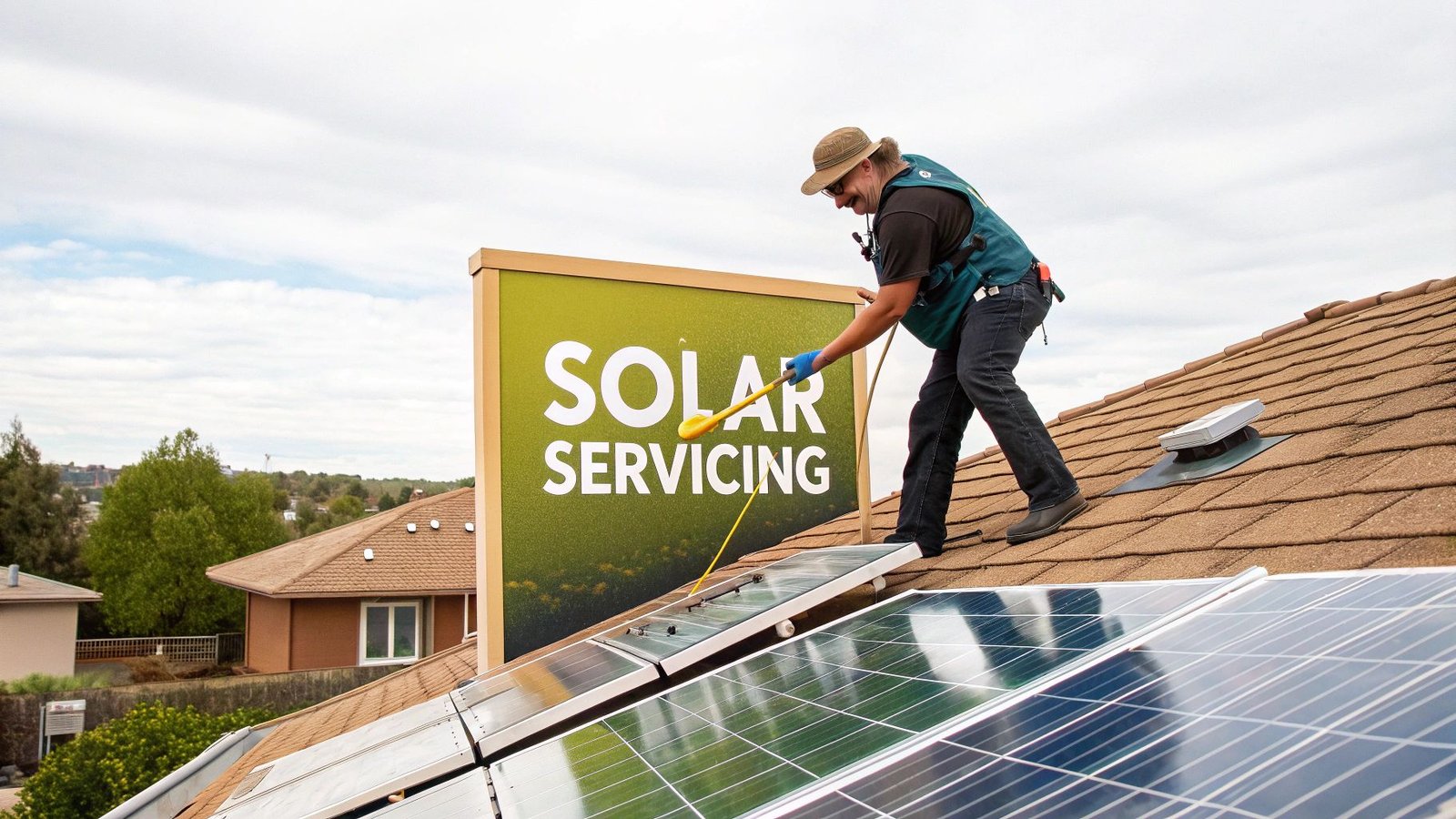Think of solar panel servicing as a complete physical for your solar energy system. It's a proactive check-up designed to keep everything running at its absolute best, protecting your investment and making sure you're squeezing every last drop of power from the sun.
Just like you wouldn't skip an oil change on your car and expect it to run forever, your solar panels need a little professional attention to maximize their energy output and head off expensive problems down the road.
Why Solar Panel Servicing Is a Smart Investment
It’s easy to see servicing as just another cost, but it's much better to view it as a strategic move to protect your home's power plant. This isn't about spending money; it's about making sure the thousands you've already invested continue to pay you back for years to come.
This kind of preventative care is all about catching small hitches before they snowball into major headaches. A single loose wire, a hairline crack in a panel, or an inverter that's quietly underperforming can eat away at your energy savings without you even noticing. A professional service call brings these hidden issues to light, keeping your system safe, sound, and productive.
The Four Pillars of Solar Panel Servicing
A proper service isn't just a quick wash-and-go. It's a methodical inspection built around four key areas, each one crucial for the health of your entire system. Let's break down what a professional technician is really looking for.
This focus on upkeep is a big deal in the solar industry. In fact, the global market for solar panel operations and maintenance was valued at around $5.83 billion y se espera que ascienda a $9.79 billion by 2029, which shows just how critical it is.
Solar O&M Market Growth Projection
Year | Market Value (USD Billions) | Growth
--------------------------------------------------------------
2024 | $5.83 | ██████
2029 | $9.79 (Projected) | ██████████
A thorough service examines the system from top to bottom, focusing on these four pillars.
The Four Pillars of Solar Panel Servicing
| Service Pillar | Objective | Actividades principales |
|---|---|---|
| Mechanical Inspection | Ensure structural integrity and physical safety. | Check racking, bolts, panel condition, and wiring. |
| Electrical System Check | Verify safe and efficient electrical operation. | Test inverter, check connections, and inspect wiring. |
| Performance Analysis | Maximize energy output and identify inefficiencies. | Review production data and diagnose performance dips. |
| Professional Cleaning | Remove dirt and debris to boost sunlight absorption. | Use proper techniques and tools to clean panels safely. |
By systematically working through each of these areas, a technician ensures that every component—from the panels on your roof to the inverter on the wall—is working together perfectly.
This holistic approach is the key. It guarantees that your system isn't just working, but working at its peak potential.
Nuestra guide to solar power system maintenance digs even deeper into what these check-ups involve and why they’re so important for the lifespan of your system. This structured approach not only protects your warranty but also locks in your energy savings for the long haul.
What a Professional Solar Service Actually Delivers
When you book a professional solar service, you're getting far more than just a quick once-over. Think of it as a comprehensive health check for your entire system, designed to protect your investment and keep it running at peak performance. It's a deep dive into the four critical areas that determine how much power you generate and how safely you do it.
It's a lot like the meticulous inspection an aircraft gets before every flight. Technicians check every bolt, wire, and sensor to guarantee safety and reliability. Your solar array is a sophisticated power plant on your roof, and it deserves that same level of expert attention.
Visual and Mechanical Inspection
The first thing a technician will do is a full physical examination of your entire setup. They have a trained eye for spotting the subtle signs of wear and tear that most homeowners would easily miss.
This hands-on inspection covers a few key things:
- Racking and Mounts: They'll check that every bolt is tight and secure. This is crucial for making sure your array can stand up to high winds and whatever else the weather throws at it.
- Panel Integrity: Technicians look for any chips, cracks, or evidence of water getting inside the panels, which can seriously degrade a panel's output and shorten its lifespan.
- Weather Damage: They'll assess the system for any damage from hail, falling tree limbs, or other environmental impacts.
A top-tier solar service company often uses advanced tools like field service management software solutions to track every single inspection point, ensuring nothing gets overlooked.
Electrical System Health Check
Next, the technician shifts focus from the physical structure to the electrical heart of your system. This is where the real magic—and potential risk—lies. Hidden electrical faults are a primary cause of underperformance and can become serious safety hazards if they aren't caught early.
The technician will meticulously inspect all the wiring for signs of fraying, corrosion, or damage from pesky critters. They'll also test key components like isolators and junction boxes to make sure they’re working correctly. And of course, they'll run diagnostics on the inverter—the brain of your system—to verify it's converting DC power into usable AC power as efficiently as possible.
This infographic really drives home how these maintenance tasks tie directly into the biggest benefits of owning a solar system.
As you can see, regular, professional care is the foundation for getting higher efficiency, a longer system lifespan, and ultimately, lower energy costs over the long haul.
Performance and Efficiency Analysis
One of the most valuable parts of a professional solar panel servicing is the performance deep-dive. This is where the technician looks at the hard data to see what the naked eye can't.
By analyzing the output data from your system, they can spot small dips in production that might point to an issue with a single panel or a specific component.
Typical Solar Panel Performance Over Time
100% |████████████████████ (New System)
95% |███████████████████
90% |██████████████████ (Potential loss without servicing)
85% |█████████████████
80% |████████████████ (Significant degradation)
---------------------------------------------------->
Year 1 Year 5 Year 10+
This data-driven approach is what allows a pro to pinpoint exact inefficiencies and make precise adjustments, ensuring your system is squeezing every last watt of power out of the sunlight.
Without this kind of analysis, your system could be underperforming by 5-10% without you ever knowing it. That’s a silent drain on your savings.
Professional Cleaning and Debris Removal
Finally, any good service includes a thorough, professional-grade cleaning. It might sound simple, but a stubborn layer of dust, pollen, bird droppings, or city grime can act like a film over your panels, blocking sunlight and slashing their output.
Technicians use specialized, non-abrasive tools and purified water to get rid of all that buildup without scratching the panel glass or leaving behind mineral spots. This simple step can immediately boost your energy production, restoring your panels to their peak light-absorbing potential and making sure you get the maximum return on your investment.
The Real-World Payoffs of Regular Servicing
It's easy to see solar panel servicing as just another expense. But I've found it's much better to think of it as a strategy—one that protects your investment and actually makes you money in the long run.
These check-ups go way beyond a quick cleaning. They translate into tangible benefits you'll see in your bank account, your home's safety, and your own peace of mind. Let’s break down exactly what you get from being proactive.
Maximize Your Energy Harvest
This is the most immediate win. Even a thin film of dust, pollen, or bird droppings can act like a shade cloth over your panels, cutting down the amount of sunlight they can capture. It's surprising how much of a difference it makes.
A professional cleaning can give you an instant bump in production. Add to that an electrical health check, and you ensure every part of your system, especially the inverter, is converting sunlight into usable electricity at peak efficiency. It all adds up to lower power bills and a faster payback on your initial investment.
A clean, well-maintained system is a productive system. Even a small drop in efficiency can add up to significant lost savings over a year.
Extend the Lifespan of Your System
Your solar panels are built to last for decades, but just like a car, they need some preventative care to reach their full potential. Regular servicing catches the small problems before they grow into expensive, system-killing failures.
During a check-up, a good technician is looking for subtle signs of trouble, like:
- Loose Connections: These can create dangerous electrical arcs and burn out key components.
- Corrosion: Catching rust early stops it from compromising the structural mounts or electrical contacts.
- Early Panel Degradation: A pro can spot underperforming panels that might qualify for a warranty replacement.
By getting ahead of these issues, you can easily push the functional life of your system well beyond the standard 25 años.
Ensure Safety and Protect Your Warranty
Never forget: you have a power plant on your roof. Electrical safety isn't something to take lightly. Service visits include inspecting all the wiring for rodent damage or weather-related wear and tear, which significantly reduces fire risk.
There's another critical piece to this: your warranty. Most manufacturers require you to show proof of regular maintenance to keep your warranty intact. If you skip professional servicing and a component fails, they might have grounds to deny your claim. Following a simple service schedule is the best way to keep your coverage and your home safe.
The industry itself is waking up to this reality. The solar panel operation and maintenance market is expected to balloon from USD 8.4 billion to USD 22.4 billion by 2034, all because more people are installing solar and realizing the need for ongoing care. You can explore more about this market growth and its implications. This isn't a niche concern anymore; it's a fundamental part of the solar industry's future.
Finding the Right Servicing Schedule for Your System
One of the first questions homeowners ask after installing solar is, "So, how often do I really need to have this thing serviced?" And honestly, there's no single magic number that fits everyone. The best schedule isn't a fixed date on the calendar but a plan that's tuned to your system, your home, and your local environment.
Think of it like this: a car that’s constantly driven through dusty construction zones needs its filters changed far more often than a weekend car that stays in a clean garage. The same exact logic applies to your solar panels. Your climate, the age of your system, and even the fine print in your warranty all have a say in how often you should call in a pro.
A good rule of thumb is to schedule a full professional service every one to two years, but some situations definitely call for a closer look.
Tailoring Your Servicing Frequency
Several key factors will help you dial in the right schedule for your system. Getting a handle on these variables means you can create a plan that keeps everything running smoothly without spending money on unnecessary visits.
- Your Local Climate: Do you live in a dusty farming area, a coastal town with salty air, or a place where trees dump a heavy blanket of pollen every spring? Each of these leaves a film on your panels that a simple rainstorm won't completely wash away. That buildup will need more frequent attention.
- System Age and Technology: Brand new systems often come with slick monitoring software that can flag performance dips for you. Older systems, on the other hand, really benefit from a regular professional inspection to spot any potential wear and tear before it becomes a real problem.
- Manufacturer Warranty: This is a big one. Some warranties actually require a minimum servicing schedule to stay valid. It’s always worth digging out the paperwork to make sure you're meeting the terms and protecting your investment.
Deciding on a servicing schedule isn't about guesswork. It's about responding to what your system is experiencing day in and day out.
This is all about being proactive. You’re not just maintaining your system; you're actively optimizing it for the real-world conditions it faces.
Recommended Solar Panel Servicing Frequency
To help you find a good rhythm for your system, the table below offers some solid guidelines based on common environmental factors. Think of this as a starting point to build a schedule that keeps your panels working at their best.
| Environment / Condition | Recommended Professional Service Interval | Recommended Owner Monitoring |
|---|---|---|
| Mild Urban/Suburban | Every 2 Years | Quarterly visual check from the ground. |
| Dusty or Agricultural Areas | Annually | Monthly check for dust or debris buildup. |
| Coastal/High Salt Spray | Annually | Monthly check for corrosive buildup on panels and racking. |
| Heavy Pollen or Tree Cover | Annually (after pollen season) | Check for leaf and pollen accumulation after storms. |
While this chart provides a great baseline, remember that your own observations are just as important. If you notice a drop in your energy production, it's always a good idea to investigate, no matter when your last service was.
DIY Maintenance vs. Calling in the Professionals
Deciding between a DIY fix and calling for professional solar panel servicing really boils down to two things: personal safety and your system's warranty. It’s a lot like taking care of your car. You'd top off the windshield washer fluid or check your tire pressure yourself, right? But you probably wouldn't try to rebuild the transmission in your garage over the weekend.
That same logic applies perfectly to your solar panel system. It’s fantastic to be a hands-on owner who pays attention to their investment, but you have to know where to draw the line. Some tasks are perfectly fine—and even smart—for homeowners to handle, while others come with serious risks that only a trained pro is equipped to deal with.
Safe and Simple DIY Tasks
For the most part, your job as a homeowner is to be the system's watch guard. You're the first one who's going to notice if something seems off, and you can do it all safely from the ground. These simple checks are your best bet for staying ahead of any potential problems without putting yourself in a risky situation.
Here's what your DIY checklist should look like:
- System Monitoring: Keep an eye on your monitoring app. A sudden and unexplained dip in energy production is usually the first red flag that something isn’t working quite right.
- Visual Ground Inspection: After a big storm, or just once a month, take a quick walk around your property and glance up at the panels. You’re looking for the obvious stuff—big branches, a heavy buildup of leaves, or a ton of bird droppings.
- Cleaning From Afar: If your panels are just a bit dusty, a light rinse with a garden hose can often do the trick. For anything more involved, be sure to check out our guide on how to clean solar panels safely for the crucial dos and don'ts.
The golden rule here is simple: your feet should never leave the ground. The moment a task requires a ladder or getting on the roof, it’s officially a job for a professional.
When to Call the Experts
Some jobs just aren't negotiable. They absolutely require the skills of a certified solar technician who has the right tools, safety equipment, and electrical know-how to handle complex issues without risking their safety or damaging your system.
Solar energy is booming, and that means the need for qualified technicians is more important than ever. By the end of 2024, global photovoltaic (PV) solar capacity shot up to over 2,2 teravatios (TW), with China alone accounting for almost 60% of that new growth. This massive expansion really drives home why expert maintenance is so vital to keep all these systems running at their best. You can discover more insights about this global PV market snapshot and see the scale for yourself.
Always pick up the phone and call a pro for these situations:
- Any Roof-Based Work: This is the big one. Professionals are trained in fall protection and know how to work safely on a roof.
- Electrical Testing: Technicians use specialized tools like multimeters to safely check wiring, voltages, and connections that you should never touch.
- Inverter Diagnostics and Repair: Your inverter is a sophisticated, high-voltage piece of hardware. A pro can interpret its error codes and handle any needed repairs or replacements.
- Panel or Component Replacement: Swapping out a damaged panel isn't just a physical task; it requires deep electrical knowledge to de-energize the system and handle the components correctly.
How to Choose a Reputable Servicing Provider
Picking the right professional to service your solar panels is just as critical as choosing the panels themselves. This decision is all about protecting your investment. You want to be sure the person working on your system is a qualified expert who won’t accidentally hurt its performance or create a safety hazard.
Think of it like finding a mechanic for a high-performance car. You wouldn't take it to just anyone. You'd want a certified specialist, and the same logic applies to your home's power plant.
Verifying Credentials and Experience
Before you let anyone touch your system, you need to do a little homework. The first step is to check their qualifications. This isn't just about finding a good deal; it's about finding someone who genuinely knows what they're doing.
Here’s what you should be asking for:
- Industry Certifications: The gold standard in the U.S. comes from the North American Board of Certified Energy Practitioners (NABCEP). Seeing a NABCEP certification is a very strong sign that the technician has been properly trained and tested.
- Seguro a todo riesgo: Don't skip this one. Make sure they have both liability insurance and worker's compensation. This is your safety net—it protects you from being held financially responsible if an accident happens on your property.
- Proof of Experience: Ask them point-blank if they’ve worked on your brand of solar panels and inverter before. Every system has its own quirks, so finding someone familiar with your specific setup is a huge advantage.
Key Questions for Your Potential Provider
Once you have a shortlist, it's time to see how they operate. A company’s communication style and overall organization can tell you a lot about the quality of their work. For instance, providers who use efficient scheduling practices tend to be more reliable and professional across the board.
A reputable provider will be transparent and happy to answer your questions. Their goal is to build trust and ensure you understand the value they provide.
Get a feel for their process by asking these simple questions:
- What does your standard servicing include? Get a detailed checklist. You want to know exactly what you're paying for.
- How do you report your findings? Will they provide a written report, complete with photos and performance data? A good pro will document everything.
- What is your pricing structure? Make sure you understand all the costs upfront. There shouldn't be any surprises or hidden fees later on.
Asking these direct questions will help you weed out the amateurs and find a true expert who will keep your solar system in peak condition for years.
Got Questions About Solar Panel Servicing? We've Got Answers
It's only natural to have a few questions when it comes to maintaining your solar array. Let's tackle some of the most common ones we hear from homeowners just like you.
How Much Should I Expect to Pay for a Service Call?
For most homeowners, a professional solar service call will land somewhere in the $150 to $300 range. Of course, this can shift depending on a few things.
Factors Influencing Service Cost
| Factor | Impact on Cost |
|----------------------|--------------------------|
| Number of Panels | More Panels = Higher Cost|
| Roof Accessibility | Difficult Access = Higher Cost |
| Service Type | Cleaning < Full Diagnostic |
The final price tag is influenced by factors like the number of panels you have, how tricky it is to get up on your roof, and what exactly needs to be done. A straightforward cleaning will be on the lower end of that scale, while a full-system diagnostic check will cost a bit more.
Think of it less as a cost and more as an investment. A single service can easily pay for itself by catching a small issue before it becomes a huge headache or by boosting your energy output enough to lower your next few bills.
Can't I Just Spray Them Down with a Hose?
That's a tempting shortcut, but it's one you should probably skip. Your regular tap water is full of minerals, and when that water evaporates, it leaves behind a chalky film that can actually hinder your panels' performance. On top of that, using harsh soaps or detergents can damage the special anti-reflective coating on the glass.
It's why the pros show up with special equipment. They use deionized water—which leaves zero residue—and soft-bristled brushes that clean effectively without scratching the surface.
Will Skipping a Service Void My Warranty?
This is a big one, and the short answer is: it very well could. Many manufacturer warranties are written with the expectation that the system will be properly maintained. If you skip regular check-ups and a component fails down the road, they could argue that neglect was the cause and deny your claim.
Think of it this way: regular solar panel servicing is the best way to keep your warranty valid and protect the investment you made in your home's energy future.
Ready to ensure your solar system is performing at its absolute peak? The experts at Energía radiante offer comprehensive maintenance and servicing to protect your investment and maximize your energy savings. Schedule your professional service today!




